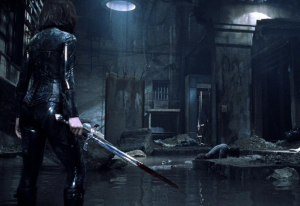Sakura Wars feels like it’s going to be divisive, given that it mixes and matches elements of so many different genres and mediums. It’s extremely anime with bits of visual novels and mecha fighters mixed in with character-driven stories and some light strategy elements, all wrapped up in a glossy package. It’s by no means perfect, but it’s also maybe exactly the right game for me at this point in time.
Videos by ComicBook.com
Which is to say, I like all of the above things, and few video games have replicated that mixture without becoming, for lack of a better term, a “hot mess.” The Valkyria Chronicles franchise, for example, scratches the same sort of itch for me with its unique characters and anime-inspired visuals, but Sakura Wars lets me live in that world whereas the aforementioned games largely only had me fight in it.
The game, which functions as a soft reboot of the franchise, tasks players as captain Seijuro Kamiyama with overseeing the revitalization of the Imperial Combat Revue. What’s the Imperial Combat Revue? Well, it’s a group of mostly women that both fight demons and put on plays for the public in Tokyo. Your revue’s seen better days, and the game starts off with the whole thing on the verge of dissolution.

What follows is a largely linear path with vignettes focusing on specific characters within said revue, each of which is interspersed with combat, dramatic cutscenes, and potentially embarrassing moments. A large number of choices in the game, for example, seem to have an option where the character you’re speaking with ends up calling you a pervert, which is sometimes probably deserved.
And really, as previously alluded to, it’s the characters that really make Sakura Wars shine. While it never gets quite as deep into developing them as I would have liked, my time with each of them was enjoyable and genuinely had me rooting for them and their endeavors. And the main character designs from Bleach creator Tite Kubo are, if not quite iconic, certainly lovely to see in action as they deal with personal, professional, and demon-shaped problems.
Unfortunately, there are a number of issues with how the game navigates spaces, both in terms of the player character running around and just menus in general. It’s all just a bit too clunky. Certain objects in the world, for instance, can only be interacted with when looking directly at them. I couldn’t tell you just how many times I found myself having to reorient the camera just to open a door or didn’t quite make a turn I was expecting to. It’s something you get used to with time, but it’s still a frustrating issue to deal with on the regular.
At its very best, Sakura Wars made me feel like I was playing through a top-tier shonen or seinen anime, and while the lows certainly exist, they are infrequent and inconsequential enough to the core experience that it makes it easy for me to recommend the game to anyone with a passing interest. While it might be mechanically lacking in some aspects, it smooths over those rough edges with a ton of heart, and I’ll always take an ambitious game that sometimes fails to reach the heights it strives for over a boring, middle-of-the-road title.
Rating: 4 out of 5
Sakura Wars is now available for PlayStation 4. A digital code was provided by the publisher for the purpose of this review, and it was reviewed on a base model PlayStation 4.








